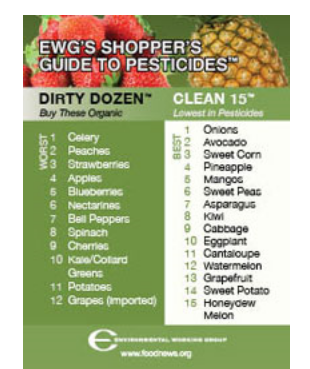 People buy organic foods for lots of reasons: They are produced without chemical fertilizers and pesticides and (in the case of animal products) without hormones and antibiotics. But a 100% organic diet may not be possible. So people often ask me which foods are most important to buy organic. Here’s my short list, in order of priority:
People buy organic foods for lots of reasons: They are produced without chemical fertilizers and pesticides and (in the case of animal products) without hormones and antibiotics. But a 100% organic diet may not be possible. So people often ask me which foods are most important to buy organic. Here’s my short list, in order of priority:
Fruits and Vegetables
Of all food types, pesticide residues are most common in fruits and vegetables. According to the FDA’s most recent (2007) Pesticide Monitoring Program Report, pesticides were detected in slightly over a third of all fruits and vegetables (domestic and imported) tested.
You’re probably familiar with the Environmental Working Group’s list of the Dirty Dozen–12 commonly eaten fruits and vegetables with the highest pesticide residues. I talked about the Dirty Dozen in my podcast on getting the biggest bang for your organic dollar.
In addition to watching out for the Dirty Dozen, you also want to check produce for its Country of Origin labeling. Be wary of products coming from Guatemala, Peru, Dominican Republic, India, and China. These countries have been put on a watch list because a high percentage of the produce coming into U.S. stores from had pesticide levels in violation of standards.
Of imported produce, berries were the most likely crop to have pesticide levels in excess of allowable standards. Two-thirds of the imported berry samples taken from U.S. grocery stores were in violation. Of domestically grown fruits and vegetables, celery, radishes, pears, and apricots are most likely to have pesticide residues in violation of EPA standards. Over half of all celery tested was in violation.
Grains
Grains and grain products are the next most likely source of pesticide exposure. Pesticide residues were found in about 29% of the domestically produced non-organic grain products sampled by the FDA. Interestingly, imported grains were only half as likely to be contaminated. But none of the grain products sampled contained levels of pesticides that were in violation of the FDA’s allowable limits.
Fish
About 15% of domestically harvested fish and about 13% of imported fish had detectable pesticide residues.
Dairy
None of the milk, dairy, or eggs contained any detectable pesticide residues. So, in terms of pesticide exposure only, organic dairy and eggs doesn’t seem to offer any advantage over conventionally produced.
Who Should Eat Organic?
In terms of reducing pesticide exposure, buying organic produce would appear to be the biggest priority. And if you can’t afford organic produce for everyone in the household, focus on the youngest members of the family. In this 1993 report, the National Academy of Sciences estimated that 50% of our lifetime exposure to pesticides occurs before the age of 5. Why? Children consume more fruit, juice, and vegetables per kilogram of body weight than adults. Giving babies and young children organic fruits and vegetables can dramatically reduce lifetime pesticide exposure.
Non-Organic Vegetables are Better Than None
Obviously, we’d all like to minimize our exposure to harmful chemicals and this information can help you prioritize your efforts. But I think it’s important to keep the dangers in perspective. It’s estimated that fewer than 4% of cancer cases can be attributed to chemical exposure, and that number all kinds of occupational exposure. However, poor diets are implicated in up to a third of cancer cases.
In other words, don’t let fears over pesticide residues keep you from eating (or feeding your kids) fruits and vegetables. The benefits of eating fruits and vegetables far outweigh the risks of pesticide exposure from non-organic produce.



Do those ‘All Natural Veggie Wash’ they sell in stores work to remove pesticides?
Also, I once heard that something labeled ‘organic’ does not necessarily mean that no pesticides where used. Just the amount (or perhaps type) is less than non-organic.. is that true?
Organic farmers are permitted to use natural pest controls, such as those derived from plants. Washing vegetables can remove some surface pesticide residues but straight white vinegar works just as well as commercial washes.
Monica,
Should that white vinegar be organic, or is it fine to use conventional vinegar to wash fruit and vegetables?
Thanks for all the great information on this and the slew of other topics you cover.
Sandy, I use generic distilled white vinegar.
Lovely just what I was looking for.
I heard a skeptic podcast once on organic pesticides. Their claim was that some of the organic pesticides are not as well-researched or well-regulated and are also known carcinogens, and must be used at a much higher dose than conventional pesticides. Do you know anything about this? Is there a way to tell which brands use these?
I talked with a pecan/ walnut farmer who said this. That his non organic walnuts were actually healthier than the organic ones. His explanation seemed logical and aligned with what you said.